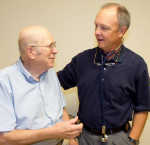Mercy gets ready to celebrate Doctors' Day

In honor of physicians, Mercy Hospital will host several activities March 26-30 designed to allow patients and co-workers to get to know the clinicians in a different light.
"Mercy has celebrated Doctors' Day for decades," Mercy Clinic Director Annamarie Holmes said. "We always look forward to recognizing the physicians for their dedication to helping care for the people of the communities where Mercy serves."
As a young woman in the early 1800s Catherine McAuley, founder of Sisters of Mercy, did everything in her power to care for the abused or homeless women and children on the streets of Dublin, Ireland. In 1832, Catherine and the Sisters were the only ones to step forward and help the quarantined sick, including those suffering from cholera.
Throughout the mid-1800s, Catherine's Ministry continued to grow and flourish.
By 1850, her ministry had expanded into the Midwest. In 1886, Sisters of Mercy opened a 12-bed hospital in Fort Scott.
Stories of physicians' outstanding commitment and life-changing work have shaped the model of care for Mercy physicians, a news release said.
The right physician can make all the difference in a patient's life as referenced in this story told by Gordon Parks about Dr. Gordon Baldwin, Mercy Hospital's first physician, the release said.
I was born dead. But a young white doctor plunged my blood-soaked remains into a tub of icy water and miraculously gave me life. With determination he had disallowed even death to defeat me. Years later, when told about the event by an older sister, I went to give him my thanks. But by then he was dead. My mother had expressed her gratitude to him by giving me his name. Dr. Gordon was the savior whose color had nothing to do with his giving me, a Black child, a right to life.
-- Excerpt from A Hungry Heart, a Gordon Parks autobiography
The first Doctors' Day observance was March 30, 1933, in Winder, Ga. Eudora Brown Almond, wife of Dr. Charles B. Almond, decided to set aside a day to honor physicians, according to Internet references.
This first observance included mailing greeting cards and placing flowers on graves of deceased doctors. Red carnations are commonly used as the symbolic flower for National Doctors' Day, www.doctorsday.org says.
On March 30, 1958, a resolution marking Doctors' Day was adopted by the U.S. House of Representatives. In 1990, legislation was introduced in the House and Senate to establish a national Doctors' Day.
Following overwhelming approval by the U.S. Senate and the House of Representatives, on Oct. 30, 1990, then-President George Bush signed S.J. RES. No. 366, which became Public Law 101-473, designating March 30 as "National Doctors' Day," the site said.
